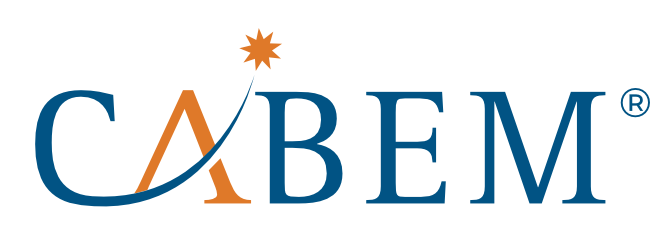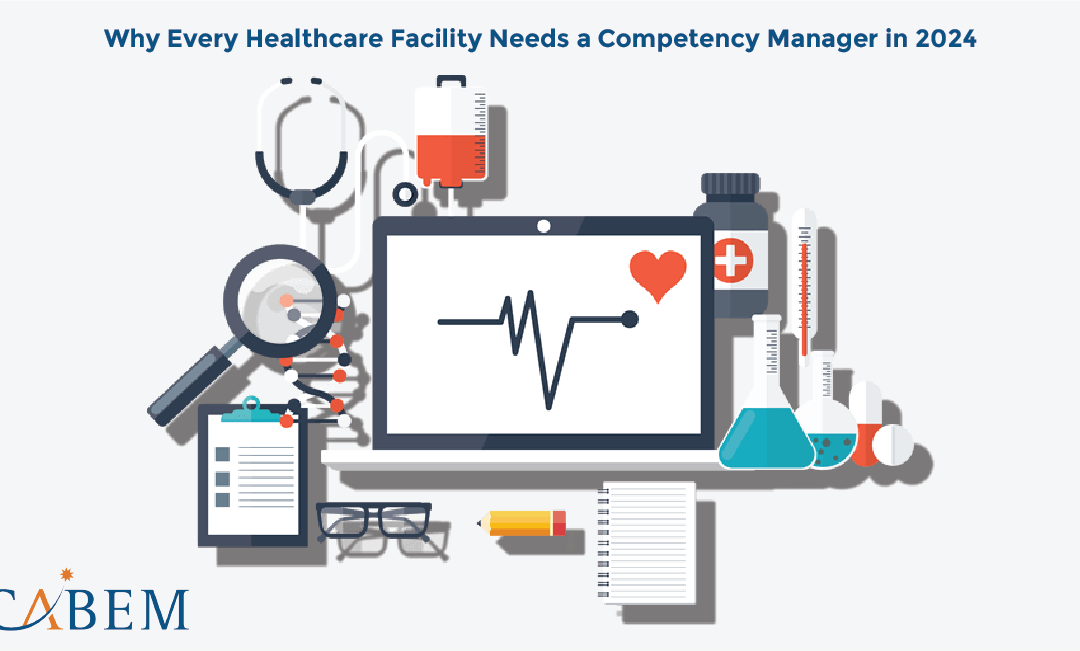In 2024, the healthcare landscape will be more complex and demanding than ever. As the healthcare industry continuously evolves, so does the need to maintain high standards of patient care.
In the healthcare system, competency management can help ensure that healthcare professionals are equipped with the necessary skills, knowledge, and behaviors to provide safe and effective care.
Competency Management is not just a tool for tracking qualifications; it’s a strategic approach to driving patient safety, increasing care quality, and improving overall organizational performance efficiency.
Integrating competency management systems like CABEM’s Competency Manager into healthcare facilities helps these organizations comply with regulations. It also supports continuous professional development and, as a result, provides the best possible care to their patients.
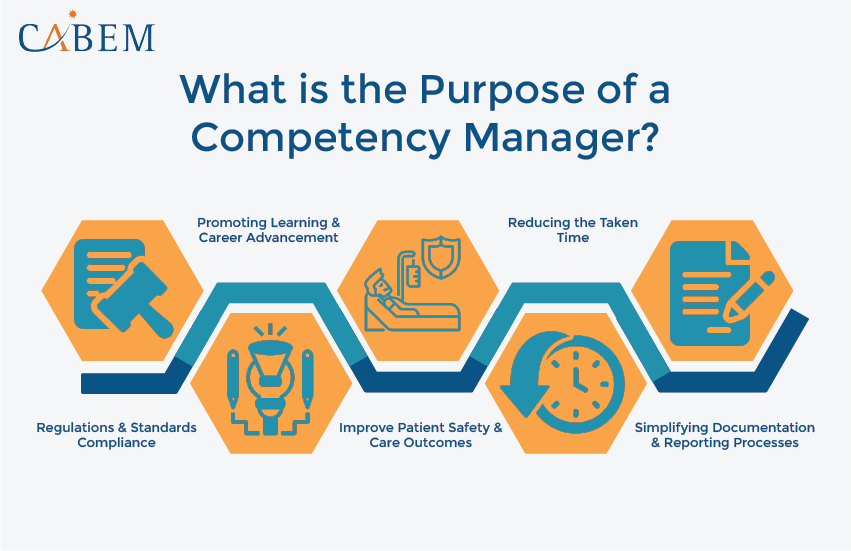
What is the Purpose of a Competency Management System?
A Competency Management System in healthcare monitors all healthcare professionals to ensure they meet the required competencies to perform their roles effectively.
Competency management is a continuous process of making assessments, tracking, and developing the skills and knowledge of healthcare staff.
A Competency Management Solution doesn’t merely focus on technical and clinical skills. It also covers critical behavioral and judgmental aspects in a healthcare setting.
A Competency Management Solution helps in:
- Compliance with healthcare regulations and standards.
- Promoting lifelong learning and career advancement.
- Improving patient safety and care outcomes by verifying that employees are proficient with their responsibilities.
- Reducing the time taken to perform competency assessment and documentation.
- Simplifying documentation and reporting processes to minimize the workload on the healthcare facilities.
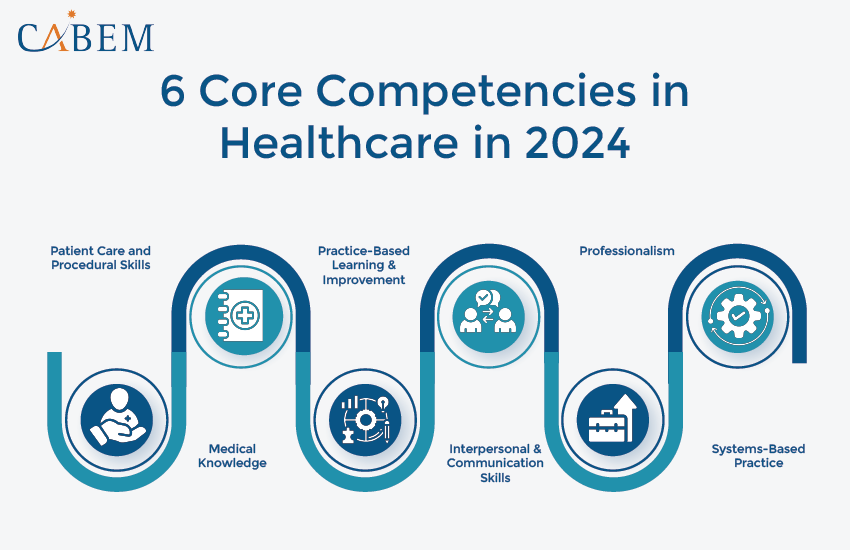
6 Core Competencies in Healthcare in 2024
In 2024, healthcare facilities are anticipated to address six key competencies to ensure the future workforce is ready to meet demands in the continually changing healthcare system.
1. Patient Care and Procedural Skills:
Clinical competencies, particularly patient care and procedural skills, are core skills for any healthcare profession. These entail knowledge of how to be nice, caring, and compassionate when handling patients, as well as how to treat and manage diseases and illnesses.
Procedural skills refer to the competencies necessary for executing certain medical procedures.
- Mastery of patient care techniques.
- Proficiency in performing medical procedures safely.
- Ability to make informed decisions regarding patient care.
- Compassionate communication with patients and their families.
- Ensuring patient-centered care is at the forefront of all decisions.
- According to the research conducted by the Agency for Healthcare Research and Quality (AHRQ) published in JAMA, patient safety was enhanced in US hospitals from 2010 to 2019. This event revealed a 36% reduction in complications for patients who had heart attacks, a 31% reduction for heart failure patients, a 39% reduction for pneumonia patients, and a 36% reduction for patients who underwent major surgical operations. These improvements were attributed to the adoption of competency management and other safety initiatives.
2. Medical Knowledge:
Medical knowledge constitutes the concrete concepts of the medical field—what causes diseases, how diseases are treated, and how they can be prevented.
Medical knowledge is progressive, thus requiring healthcare workers to update their knowledge from time to time about new discoveries in the field of medicine.
- Professionals must have an understanding of the pathophysiology of diseases.
- Keeping abreast of current developments in the medical field.
- Incorporation of medical knowledge into clinical experience.
- Applying acquired knowledge to incorporate new medical technologies and treatments into patient care.
- Raising awareness among patients and colleagues about disease and treatment.
3. Practice-based Learning and Improvement:
In practice-based learning and improvement, the emphasis is on the potential to assess one’s practice and enhance it with feedback and outcomes in addition to scientific data.
This means that healthcare professionals need to devote effort and time to an ongoing learning process to improve their abilities and field knowledge.
- Preparation of a critical evaluation of the clinical practice.
- Applying current knowledge and practices to enhance the quality of patients’ care.
- Engaging in professional development activities.
- Applying quality improvement measures in the context of a healthcare organization.
- Integrating new methods of healthcare services and improving health standards.
4. Interpersonal and Communication Skills:
Communication skills play a central role in practice because errors due to a lack of proper communication significantly affect the healthcare setting.
For instance, healthcare practitioners should be able to impart information to patients, family members, and other caregivers to encourage better care delivery among health facilities.
- Communicating clearly and compassionately with the patients and their families.
- Cooperation with other health care professionals to provide proper interprofessional care.
- Intervening with patient concerns appropriately and effectively.
- Counseling patients on their specific health conditions and the best ways to manage them.
- Mindful interaction and communication with the patient and their family.
5. Professionalism:
Healthcare professionalism entails embracing ethical standards, patient diversity, and continuous improvement.
Healthcare professionals should ensure that they uphold the values of integrity, respect, and accountability in their practices.
- Compliance with professional ethics while handling clients.
- Respect for patients’ identities and information confidentiality.
- Adherence to the principles fosters a culture of continued learning and professional advancement.
- Accountability for actions and decisions in the workplace.
- The ability to relate well to patients of different cultural backgrounds.
6. Systems-based Practice:
Systems-based practice encompasses competencies that enable functional and effective practice within the broader context of the healthcare system.
This includes understanding the impact of the healthcare system on patient care, working within financial and regulatory constraints, and advocating for quality patient care.
- Knowledge of the structures and delivery of healthcare services.
- Understanding and managing healthcare legislation and laws.
- Promoting the proper treatment of patients in the healthcare system.
- Partnering with healthcare systems to benefit patients.
- Efficient and effective healthcare resource management.
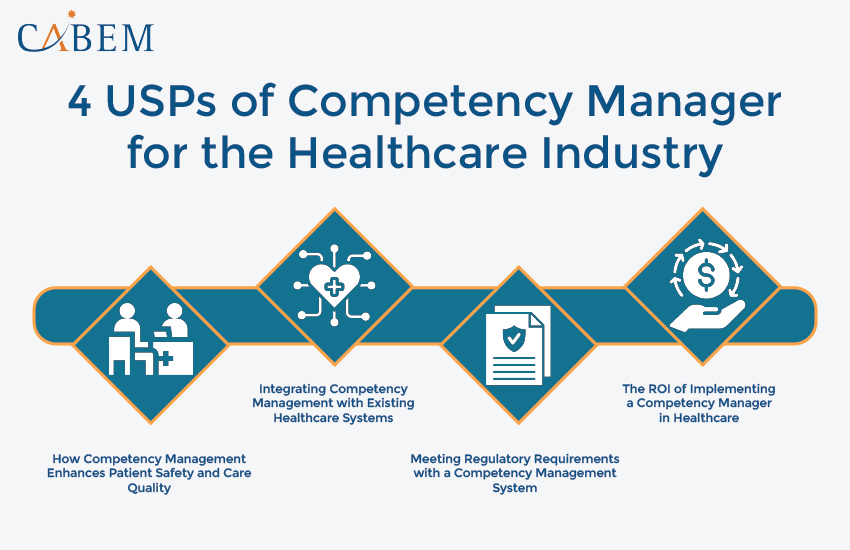
4 USPs of Competency Manager for the Healthcare Industry
- It was also identified that competency management programs implemented in healthcare organizations positively enhanced patients’ prospects. For example, hospitals that paid attention to performing competency assessments and training reduced their medication mistakes by 20%. This is in line with enhancements in patient safety as captured in the AHRQ’s 2024 Chartbook on Patient Safety, which measures national safety improvements.
1. How Competency Management Enhances Patient Safety and Care Quality:
Competency management directly impacts patient safety and care quality by ensuring that all healthcare professionals are competent in their roles. A Competency Manager like CABEM ensures that staff members are continuously assessed and trained, reducing the likelihood of errors and improving patient outcomes.
- Real-time tracking of competency status for all staff members.
- Automated notifications for upcoming training and certification renewals.
- Immediate identification and remediation of competency gaps.
- Enhanced patient safety through ongoing competency assessments.
- Improved care quality by ensuring that all staff are up-to-date with the latest best practices.
2. Integrating Competency Management with Existing Healthcare Systems:
CABEM’s Competency Manager is designed to integrate seamlessly with existing healthcare systems, making it easier to implement and use. Whether it’s an existing Learning Management System (LMS) or other healthcare software, the CABEM Competency Manager can work alongside them to provide a comprehensive competency management solution.
- SCORM compatibility for easy integration with existing LMS.
- Customizable to fit the unique needs of any healthcare organization.
- Centralized management of all learning and competency activities.
- Streamlined workflow with integration into existing HRIS systems.
- Simplified onboarding and training processes for new staff.
3. Meeting Regulatory Requirements with a Competency Management System:
Competency management directly impacts patient safety and care quality by ensuring that all healthcare professionals are competent in their roles.
A Competency Manager like CABEM makes healthcare facilities compliant by automating staff competency, credentialing, and training checks.
- Increased or automated compliance management for ISOs, OSHA, and other regulations.
- Ready-for-audit records of training and competencies.
- Reduction in the management and overhead costs of compliance responsibilities.
- Confirming that all certifications and credentials of each staff member are valid.
- Ease of audit preparation with advanced reporting solutions.
4. The ROI of Implementing a Competency Manager in Healthcare:
When introduced and set up within a healthcare facility, the competency management system will yield a high ROI. Thus, a Competency Management System can result in saving the amount spent on tracking, upgrading the competency of staff, and ultimately increasing the positive impact on patients’ lives.
- Savings on administrative expenses for manual tracking.
- A better state of patients leads to a higher patient satisfaction score.
- Improved staff productivity and minimized turnover levels.
- Savings on the possible penalties that could have been incurred without compliance.
- Efficiency in training and development processes.
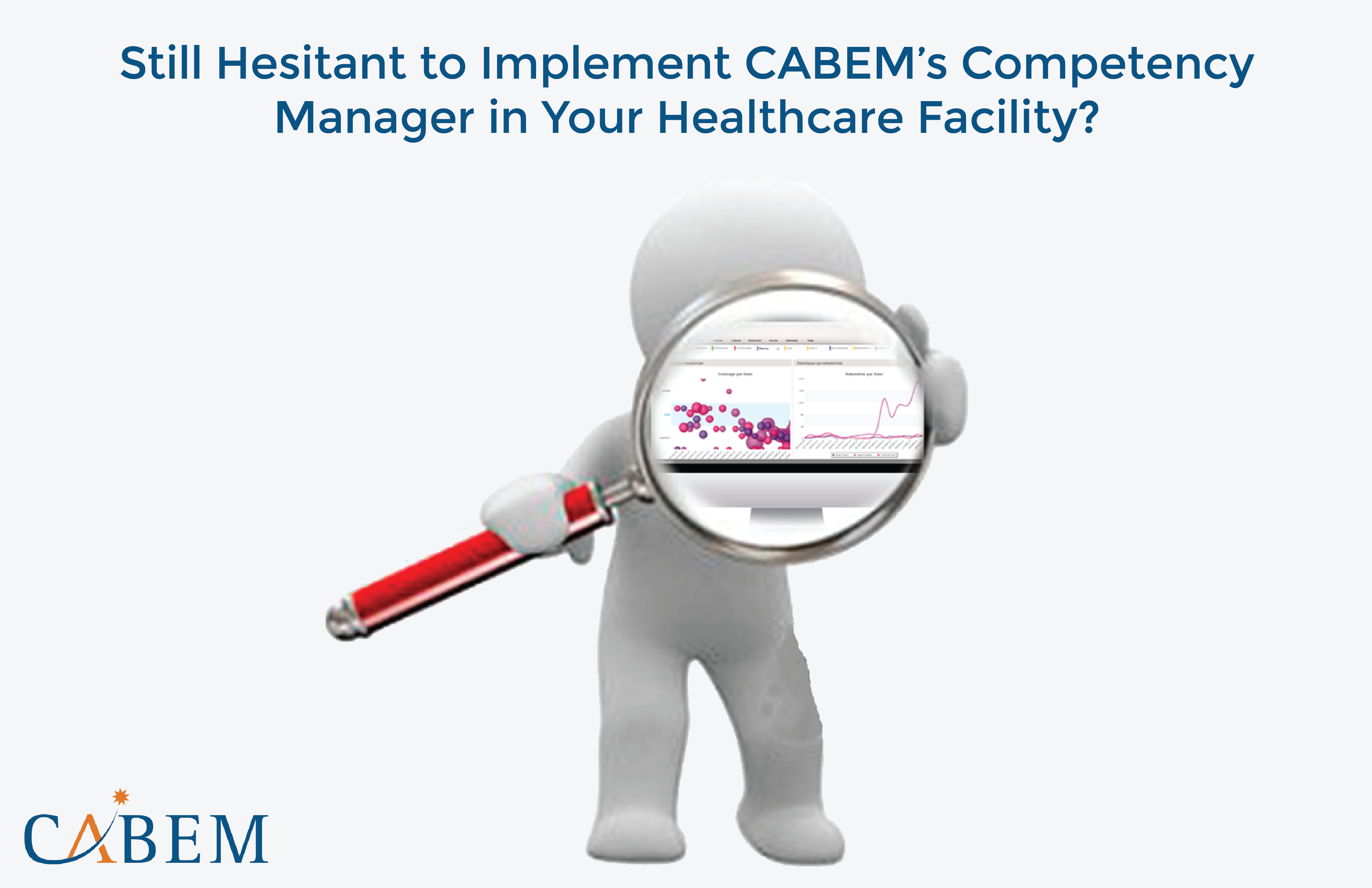
Still Hesitant to Implement CABEM’s Competency Manager in Your Healthcare Facility?
Not Convinced to Use CABEM’s Competency Manager in Your Healthcare Facility?
If you are still not convinced about using CABEM’s Competency Manager in your healthcare facility, then consider the associated consequences and risks of excluding it.
In the current highly competitive and regulated context of healthcare organizations’ activities, safeguarding the competence and compliance of your staff is not only desirable but required.
You can also read this case study to learn how healthcare systems can benefit from integrating CABEM’s Healthcare Credentialing & Competency Platform: “Medical Franchise Manages the Credentials Process Through Strategic Integrations.”
Also, you must read this blog, “Competency Management System: Why Your Organization Needs One!” to understand how it can benefit your organization.
CABEM’s Competency Manager is a holistic solution for your organization. It is affordable and adaptable to all healthcare organizations. When implemented, you can expect better patient outcomes, regulatory compliance, and increased overall efficiency in your organization.
FAQs
What are the benefits of a Competency Manager in a healthcare facility?
A Competency Management System tracks the certifications and credentials of staff. It facilitates online training and helps pass audits with ease. Moreover, it maintains compliance, provides at-glance reporting, and supports CEU and CME accreditations.
What is the difference between CEU and CME?
CEU (Continuing Education Unit) and CME (Continuing Medical Education). Both of these terms represent units of credit for continuing education in healthcare. CEUs are typically broader and can apply to various healthcare roles. On the other hand, CMEs are specific to medical professionals like doctors. CMEs are also required to maintain medical licensure.
What is the difference between skills and competencies in healthcare?
Skills refer to the specific technical abilities required to perform tasks. While competencies mean a broader range of attributes, including skills, knowledge, behavior, and judgment. All these competencies are necessary to perform a job effectively in a healthcare setting.
Can I implement CABEM’s Competency Manager in an organizational-level healthcare facility?
Yes, CABEM’s Competency Manager is scalable and customizable to fit the needs of any healthcare facility. It can be implemented from a small clinic or a large hospital system to manage competencies across multiple locations, departments, and roles.
